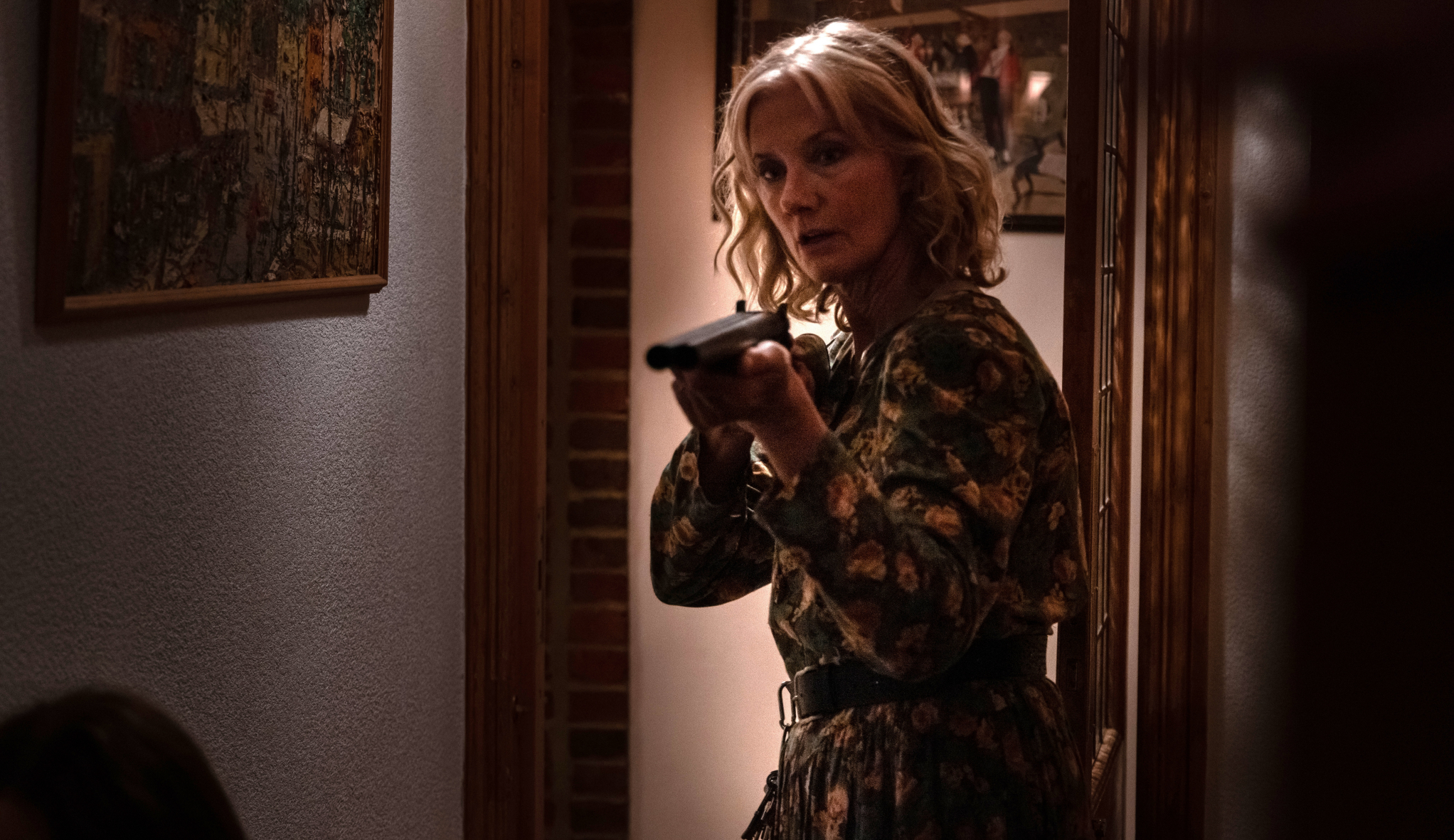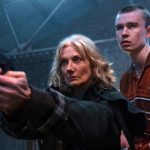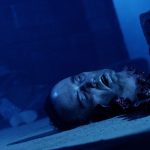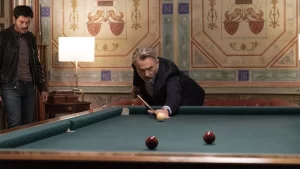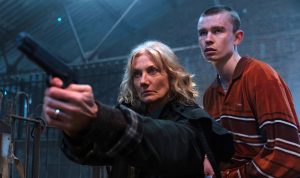After two fugitive brothers Jack and Matty stumble upon an isolated lodge and meet the mysterious Mama, events quickly escalate out of control in a way that neither of them could have ever predicted! As well as writing the brilliant script for Little Bone Lodge, actor Neil Linpow took on the frustrated character of Jack! STARBURST talks with Neil to discuss his horror feature film idea and the layered main characters that dare to live within it…
STARBURST: How did the idea for Little Bone Lodge come about?
I’d made a couple of short films that were all set in one location, with one actor, and they were primarily because I wanted to create something that was a bit of a vehicle for me as an actor but also something that could be shot cheaply, quickly, and economically. Matthias had seen these couple of short films and approached me when we were in lockdown to say that he thought it would be a really good idea to try and look at how features might be made post-COVID. Stuff that could be shot quickly with minimal cast and crew in one location, and how that would be attractive to production companies, and given the fact that I had made these couple of shorts that were all thriller sort of esq, and set in one place, did I have any ideas for a feature. And I suppose, for me, it was about “How do you create drama when you can’t go anywhere?” It has to come through characterisation, right? And how can you keep an audience entertained for 90 minutes when the characters, for the most part, don’t even leave two rooms? So it became about that being the brief and thinking what sort of stories can fit into that. So that’s where I started from, really, and then it became about developing who these people were, and I’ve always enjoyed films that have twists and turns that keep the audience on their toes. I think films that operate out of misdirection can usually be some of the most rewarding films to watch. I tried to do that and create characters that defy the sort of traditional expectations or stereotypes, and that was it really.
As a writer, this is your first full-length movie, right? So how exciting was that for you, and also, how did you approach working on something with this kind of runtime?
I had written a lot of short films before, well I say a lot, I had written a few short films before. For me the process of doing it was about getting the story out first before I wrote, to sit down and write “Int, Farm House, page one” I think would have been an absolute disaster. So I had actually written out a pretty detailed forty-page treatment as to where the story went, and that’s what we actually used in the first place to send to the UK production company, to say, “Look, this is the story, this is what happened?” and it is pretty much beat per beat, it’s almost the way that like Cormac Mccarthy might write a novel, where it just sort of flows, and drives through the story. So anybody that read it, would have known whether they didn’t like it, whether they weren’t interested. Obviously, having never written a screenplay before, there was still an element of “Could I do it” so as much as people would have liked the treatment or thought that there was merit in the story, they still needed to see how the script would come about, before they would want to get on board with it. But for me, having that blueprint, you are basically just going back into the scenes and adding dialogue, and a little bit of flavour and colour, because your scenes are already there. I’ve written a few things since then, and I’ve approached it the same way, and I’ve found that it’s pretty useful.
Did you always want to play Jack? Was that something you had in mind when writing the script?
It’s the only reason I wrote the script. I was basically at a point in my career where I had pretty much stepped away from acting. It became this thing where I realised that if I wanted to go back to it, I had to be proactive and do something myself, and waiting for that call from my agent, “Spielberg is on the phone; he wants you to come and read…” that ship had long sailed, so if I wanted to create an opportunity for myself, I had to create it myself. One of the most rewarding things about making it was knowing that my flag was very firmly in the ground, we make it with me playing Jack, or we don’t make it at all. I always had that stance. Had there ever been a situation where someone had come around and said, “Well, we can make it, but you can’t do it; we have to cast X actor” I would say “Well, we just won’t do it!” So, that was a good thing to have because I could fall on my sword for something that was really important to me.
And, can you elaborate on what it’s been like to work with Matthias? Because there’s an interesting dynamic there, where you’re acting in the movie, and Matthias is directing with your writing style in mind?
Yeah! That in itself was interesting for me because it was the first time that I had ever written anything that somebody else has directed. All be it, the short films I’ve made have been made for absolutely nothing. But it is interesting when you write something. Then somebody else interprets it, but what’s amazing about making a film is that I had this question asked to me a few times on set, where people would be like, “What’s it like seeing your vision come to life?” and the reality is, that the minute you populate the film with other people’s creativity, it’s not your vision any more, it becomes a collective vision, and that only makes the project stronger. So as soon as you cast Maisy, Matty, or Mama, those actors are bringing their own personalities, their own ideas into that character, so, certain scenes, even in the way that scenes played with Jack, when I was writing stuff, I might have had a very clear idea of how a scene would play, or how I would play that scene. Then you get into the room with the other actor, and you’re listening and responding to them. You’re listening and responding to the way that Matthias is wanting to shape the scene, and you realise, “Well, I can’t go in with that locked idea of how I thought that it read in my head”. You have to play it in the moment. There were definitely things that weren’t as I had seen them in my head, and that in itself, it does take a minute. The reality is that it does take a minute for you to sit back and go, “OK, well, this isn’t exactly what I thought it was going to be” but that doesn’t mean that it’s not stronger or more interesting, because you have these talented people around you. It makes the process more enjoyable, I think.
Perfect! So, digging into the acting side of the movie a bit further, how would you personally describe the character of Jack on a surface level? As a viewer, it feels like he is just always on the edge of losing it! Like, he would be that way even if he wasn’t in this situation.
I mean, he is definitely desperate. On a surface level, I’d say that he is somebody that’s been thrust into responsibility all of his life that he didn’t want and that he is not really equipped to deal with it. He is walking this line where he is wanting to have a sense of his own identity and a sense of possibility for himself, but knowing that he has this albatross around his neck. This burden of responsibility that he can’t give up, and he doesn’t want to, whether he realises that or not. Having been abandoned, the only thing that he and Matty have are each other, and he needs Matty as much as Matty needs him. But it’s this being able to blame everything, all of his shortcomings on Matty, on something else, is like the armour he wears. So I’d say that on a surface level, that’s it. Scratching beneath the surface, I think the hardest thing with a character like Jack is when you write that character, you can’t write him to be vanilla because ultimately, I guess he is the character that I hope by the end of the film the audience needs to have some sympathy for. If the film works, he is supposed to be presented as the antagonist, and as the film goes on, he kind of flips to being the protagonist in many respects. You turn the character on the head. If you don’t give a shit about what happens to him at the end, it’s less effective than if you do. So it’s quite a hard roll. You can’t go into it making him too nice and wishy-washy at the start. Otherwise, you won’t care about him, and then you can’t have him too deplorable because then you won’t be able to warm to him. It is a fine balance between finding those tender moments between him and Matty, where the audience can see that there is something more going on with him. He isn’t your out-and-out kind of bad guy, but then you need to have those moments of darkness, and spite, and sort of the sense that he could do something horrible.
Matthias said that you were in character while on set. How fun was that for you, and what do you think it brought to how we see Jack on-screen?
I mean, I don’t think I was in character. I think it would have been pretty hard to direct with me if I was in character on set. I think that there were a lot of big emotional moments in the film, and you know, my character has to go through quite a plethora of hard things to do. So for me, when you’re working and you’re on set. I think it’s better to try and stay in a head space which allows you to do that. I’m not the sort of actor that can go from banter and jokes to action, and then be horrible, and be emotional, or whatever. But you can’t play drunk and be drunk because you can’t take direction. You can’t be an abrasive, hard-to-reach character and then take direction.
You share a ton of great scenes with Joely Richardson, can you tell us about what she was like to work with, and maybe what you think that she brought to the movie?
As an actor, she’s incredibly generous as a performer and collaborative. I think that it was very clear to me, from the beginning, that she was involved in the film because she saw some potential in the script and in the character. This is not a film that she had to do; this is a film that was a gamble for her. She’s already a very established talent, so to come and make a small British Film. it’s a gamble. She came into it with the mindset that she was going to make this the very best thing that it could be, and she cared very deeply about the material, about the character. The reason why things were happening on the page. As an actor there are other actors that would try to make the film about themselves at the detriment of the film. In contrast, Joely was almost the other way around, where there were scenes where she was helping the younger actors to open themselves up to get more coverage. As an example, there might be a shot where it’s a two-shot on them, and Harry is crying into her shoulder. So she could have very easily turned that into a single by pulling him around. But what she would be doing is like, “Harry, all the work you are doing is amazing, but right now, no one can see it” so if we turn the other way, I can turn my shot into a profile. Then you’re in profile, and then that becomes a two-shot, and then we’ve got some really nice coverage of what you’re doing. It sounds like a daft thing to say, but there are a lot of actors that wouldn’t do that. With me, she was very encouraging. With the physical stuff, she’s an absolute warrior. She’d be like, “Grab me by the neck, pull me down” I’m like “Oh god, are you sure?” and she’d be like “Yep, do it!” So I really enjoyed working with her, she is a lot of fun. She allowed the film to happen as much as anything else. We wanted an actor like Joely, and she was one of the very first people that Matthias and I talked about when I was writing it. When we were spitballing actors in our head, she was on a list of people, where we’d be like, “They’d be great!” and I think that’s why Matthias went after her. He went after her so doggedly to get her in the film, because we liked her so much. If she had said no, I don’t know if the film would have got made because nobody else at this point in their career has the value commercially to get the film off the ground. It was great.
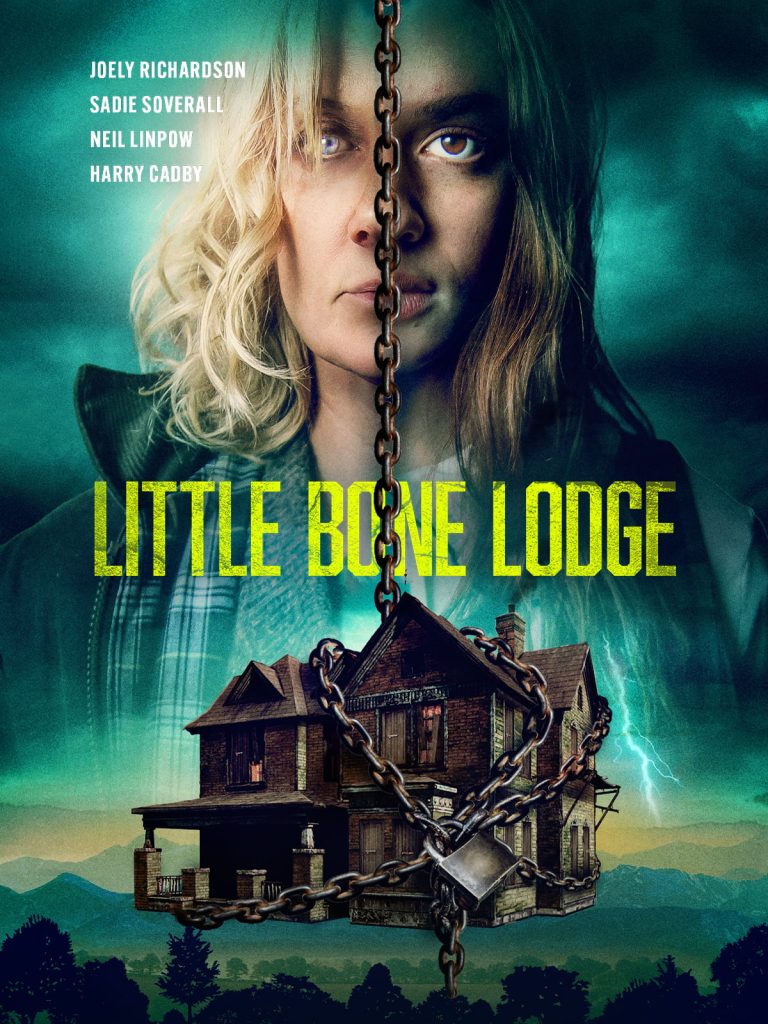
Ultimately, all four of the main characters have a brilliant and detailed back story that relates to family. How important was it for you to have this depth to each character, and what was it like to balance all of those plots equally?
That was hugely important. For me, I have to care about the characters in a film. You can watch a film that has got amazing set pieces, or that does something visually that you’ve not seen before, but if I don’t care about the people, I don’t care about the story, but for me, it was like. You’ve got two problems, if you set a film in a house, you’ve got to make sure the people that you’re watching are interesting, and then number two, you’ve got to make sure that, like in any film, you give a shit. Like “Why do I care?” I’ve definitely been involved in projects before (Not stuff I’ve written, thank God, but stuff I’ve been in) where people have said, “I don’t care about any of the characters.” A lot of that comes from the writing, so for me, it was about finding the duality between the two families, I thought it would be really interesting if they needed something from each other that only each other could give them. So like, with Jack and Matty, they need a maternal figure, and Mama needs a family, and it’s this whole idea that actually they could probably all benefit from each other if they could get out of each other’s way. If that makes sense. But I’m really pleased that that comes through.
There are some brutal action/fight scenes in this movie; which one was the most maybe, complicated to put together, and why?
Definitely the fight with the police officer. For a couple of reasons, as I said, the budget for this film was not high, so we didn’t have lots of prep time. We did have an amazing stunt and fight choreographer, Dan Styles, who had Clifford Samuel (PC Adams) and I in for a day to learn that fight. Basically, some of his fight team had put this fight together and sent us a video of what it looked like, and we were a bit like, “OK!” and then we went in, and we had a day to learn it, and then about two weeks later we were on set, and we had an hour or so to brush up on it, and go again. We were really lucky that Cliff was super athletic and professional, and he just threw himself into it, and I come from a sports background. I always see myself as being someone who is athletic, and I’ll chuck myself into anything. So we got through it. It wasn’t always easy. I get choked out a lot in that fight. There were a couple of times when the choke hold was a little bit tight. I think it might have been the only time in the whole film where I threw the toys out of my pram slightly, there was a point where I was in a headlock, and I realised the camera was looking at my feet, and I was like “Guys, come on” So yeah, that was a bit of a challenge. Then all of the other stuff, I’m just crawling around the floor a lot, and getting punched in the face a lot, so yeah, it wasn’t too bad.
There are some great twists in this movie, especially with how it ends. So, how fun was it for you as a writer – or actor – to navigate Jack through all of these nightmarish twists and turns, and what do you think the viewer can expect from watching his journey in the movie?
I grew up through the 90s watching some of today’s most important filmmakers. Those early Fincher films, like Seven, Fight Club, The Game, and then stuff like The Usual Suspects, The Sixth Sense, and Primal Fear. Films where they get to that moment in them, and you’re like, “What!” and they’ve always been some of the most satisfying films that I’ve seen. So I definitely wanted to try and catch the audience out a few times or keep them on their toes at least. Some savvy viewers might predict the odd bit coming up, but hopefully, it always takes you in another direction as well. I would hope that an audience goes into a film as blind as possible. That would be my hope. I think that with any of the trailers, or if they give too much information away, it might detract from some of it. Having looked at some of the reviews that have come off the back of Fright Fest, a lot of what people have said is that the turns in the story were the things that caught them out, or they really enjoyed, and the best way to view it is to know next to nothing about it. So, I would love for it to be sold that way because it’s got a strong first-view potential, and I think even if you go back, there are little bits that are laid into it that make it more interesting. I’d like people to go into it as blind as possible and just sort of experience it. Knowing as little about it as they can, really.
Little Bone Lodge is available on digital from May 22nd. You can read our interview with the director Matthias Hoene here.

